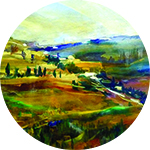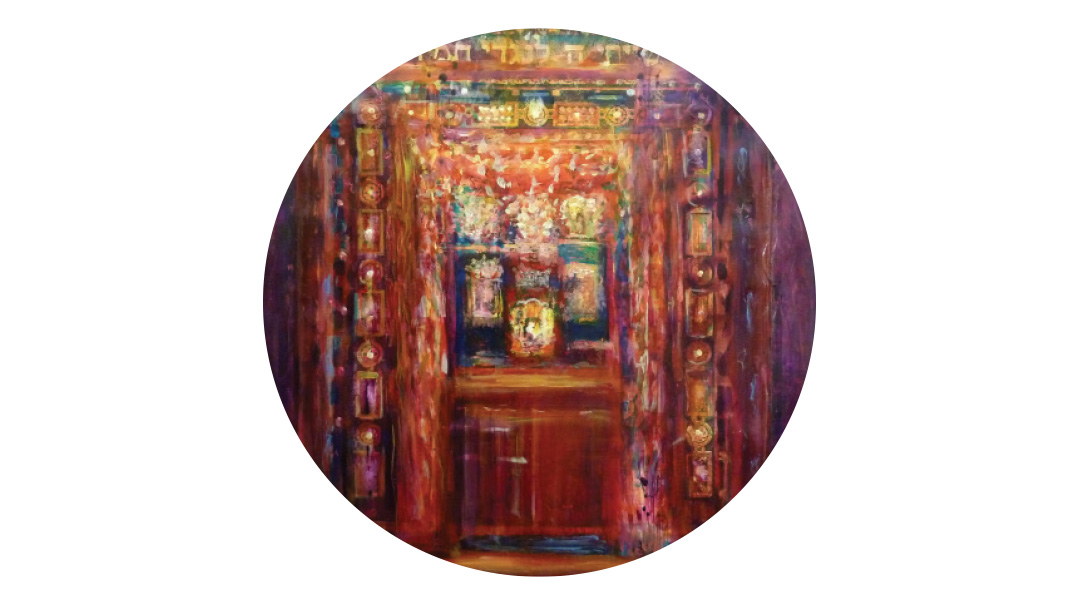His Son Is My Brother

If she’s not our sister, can we be His children?

Oh, those summer memories! I think back to when I attended Camp Sternberg 30 years ago, as we sat and watched the bold campfire and sang Abie Rotenberg’s “I’m an ancient wall of stone atop a hill so high, and if you listen with your hearts, you just may hear my cry.”
When we reached the words, “A House of marble and of gold once stood here by my side,” our mind’s eye would take us to the Yerushalayim we’d visited or seen in pictures. And at the words, “But sinas chinam [baseless hatred] brought it down, and with it so much pain,” we watched the flames flicker upward, saw the destruction that continues to fester.
We wrapped our arms tighter around one another and crooned with the earnest sincerity that’s so much a part of being a young Bais Yaakov girl, “Now only ahavas Yisrael can build it once again… together!”
Pursuing Peace
Hillel Hazakein (Avos 1:12) points to Aharon HaKohein as the quintessential oheiv Yisrael. He imparts the value in being like the students of Aharon, who loved peace and pursued peace. The premise is that loving peace is not enough — those who are considered the students of Aharon actively pursuit it via every word and action.
The only yahrtzeit mentioned in all of Tanach is that of Aharon HaKohein. Klal Yisrael lost the “oheiv shalom v’rodef shalom” on Rosh Chodesh Av. Rav Nosson Meir Wachtfogel writes that the first day of a month represents the essence of that month.
Aharon HaKohein was to the Jewish People spiritually what the Beis Hamikdash was physically.
On the first day of the month in which the Beis Hamikdash was destroyed, Klal Yisrael lost the force that connected one Jew to another and fostered ahavas Yisrael.
Aharon died at the edge of the land of Edom, the very land whose empire is the galus we’re trapped in today. This galus has scattered our people to the four corners of the globe.
With the death of Aharon, the Jews in the desert also lost the Clouds of Glory, which enveloped them in comfort and safety and fostered achdus and shalom. Yerushalayim is called the “ir shechubrah lo yachdav,” the city that connects all together.
Let’s study Aharon’s school of thought and become worthy of being called his students.
Let’s try to understand the foundations of this love of others we’re trying to emulate.
On One Foot
The sefer Middos V’hanhagos Tovos by Rav Yechiel Michel Stern quotes the Tanna D’bei Eliyahu (ch. 28) in its opening: “Hashem said to Yisrael, ‘My children, my beloved, what do I ask of you? Love one another, honor one another, be in awe of one another.’ ”
In his famous encounter with a prospective convert (Shabbos 31a), Hillel proclaims that Judaism stands on one principle. He doesn’t cite the famous dictum upon which Chavakuk posits the whole Torah stands, “A tzaddik lives through his emunah.” No, while standing one foot, Hillel puts everything into a single teaching: “Do not do to your friend what you wouldn’t want done to yourself.”
Why did Hillel consider this to be the Torah’s primary message? The answer echoes clearly through many sifrei mussar and machshavah: One can’t love Hashem if he doesn’t know how to love another.
In Mishpacha’s Shavuos issue, Rabbi Dovid Bashevkin mentions a lesson gleaned from his (and our) rebbi hachashuv, Rav Tzvi Berkowitz. He recalled his rebbi teaching that while much of the custom to stay up all night on Shavuos doesn’t make sense, that’s in fact the beauty of it. Were the goal of the late-night/early-morning learning only limud Torah, it would make much more sense to get a good night’s sleep and put in a rigorous day of learning during the day. “We stay up all night,” he explained, “because when you’re in love, you do crazy things.”
I don’t think I fully appreciated the depth of his explanation until I was married. Once you’re married, you begin to realize what it means to do something beyond reason for someone else.
Where the Heart Is
The first step to ahavas Hashem is to love your fellow man. It’s why Adam was created with someone else. I heard a famous parable from the Maggid of Dubno: Two brothers lived in the same city. One was as rich as the other was poor. They both loved and doted on their elderly father, but the wealthy brother took great care to avoid the shame and embarrassment of being paired with his impoverished brother. He didn’t invite him to his simchahs, didn’t greet him in the streets, and certainly made no attempt to alleviate his brother’s financial stress.
When the elderly father neared his death, he refused his wealthy son entry to his room. His impoverished son sat with him, said Tehillim, and sang with him, while his brother stood brokenhearted by the door. Finally the wealthy brother calls out in unbearable pain, “Father, will you not see me before you go to the Next World?”
To which his father responded with otherworldly strength, “If he’s not your brother, then you’re not my son.”
Hashem is looking at us now. Do we consider the weird, the uncool, the people different from us to be our sisters? Do we love them and want what is best for them? Do our hearts break when we hear of other people’s pain and suffering? Or do we casually click on Amazon immediately after reading about a Yid’s pain?
Are our familial bonds what they should be? Do we treat our brothers and sisters with the ahavah and achvah that should be shared between siblings? Hashem is crying in Shamayim as the Mikdash continues to burn. If she’s not your sister, then I’m not your Father, He says.
How to Love
On my last trip to Eretz Yisrael, I stopped at the duty-free shop to purchase some gifts. The cashier pointed to the sign posted next to her register. “Ahava b’chinam,” it read. It was advertising free Ahava Dead Sea products with the purchase of related items.
Literally, however, this read, “Love is for free.” I responded, “Love is for free, but you need to know how to give it and how to accept it.”
Rav Dessler, in Michtav MeEliyhau (Part III, p. 88), describes the various stages of avodah in improving ourselves in fulfilling the mitzvah of v’ahavta l’reiacha kamocha, loving your neighbor as yourself.
He lists three levels:
Wanting your friend to have all the good in the world, even if they have things you don’t have. This is the love felt between Dovid and Yonason. Yonason blesses his friend with success in taking over his own father’s kingdom. His love for Dovid was so strong that the Mishnah describes it as “love not dependent on anything else.” A love that says, “I can have pleasure seeing you blessed with the things for which I’m davening and may never get, simply because I love you so much!”
This is the ability to dance with your heart full of joy at your friend’s daughter’s wedding while yours sits at home longingly awaiting a date. This is complimenting and truly deriving pleasure from your neighbor’s new, home, clothing, car… while your family struggles to put food on the table.
Loving you even when you hurt me, because I view you as a part of me. He quotes the famous mashal of one who is slicing meat and accidentally cuts his left hand in the process. Only a crazy person would then pick up the knife with their left hand to retaliate and hurt the right hand. I may experience another Jew doing things that pain me greatly. As long as it’s not blatant wickedness, we’re still expected to love them.
The love of Klal Yisrael is the love of a family. My aunt loves to say that the State of Israel is one big dysfunctional family. I think there’s no place in the world where we can better sense that feeling of mishpachah.
Feeling a sense of the tzelem Elokim in each person. Says Rav Dessler, “One who is humble before Hashem will feel humble before his friend, for his friend was created by Hashem in His image.” The more one loves HaKadosh Baruch Hu, the more one will love His children.
When Sgt. Yossi Cohen Hy”d was murdered this past year, his stepfather, Rav Eliyahu Meirav, spoke with the press. His words were both heartrending and poignant: “Why do we meet in the darkness? Why do we feel that we’re brothers only when we’re in pain? Let’s meet in happiness!”
Sheyibaneh Beis Hamikdash bimheirah b’yameinu — let’s build.
Originally featured in Family First, Issue 653. Rebbetzin Aviva Feiner is the rebbetzin of Congregation Kneseth Israel (The White Shul), and menaheles of Machon Basya Rachel Seminary, both in Far Rockaway, New York.
Oops! We could not locate your form.







